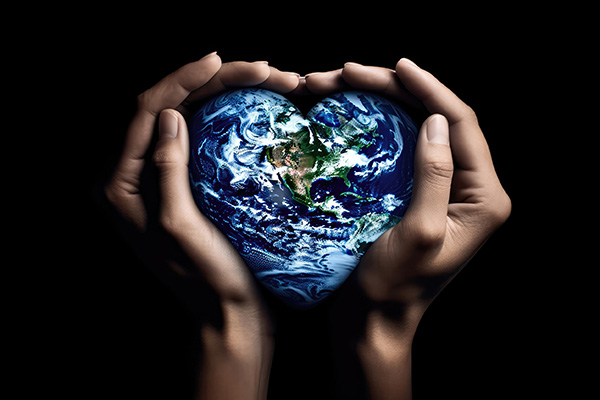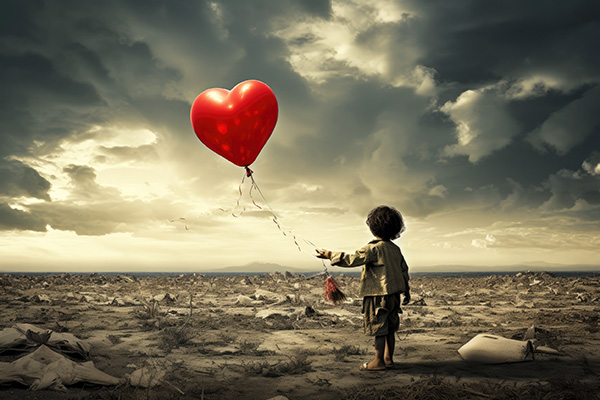kindness
Maybe This Is How We Mend Our World
 I have certainly been trespassed against over the years, as I suspect you may have too: maligned, misunderstood, abused, betrayed. Many of us have been hurt and wounded.
I have certainly been trespassed against over the years, as I suspect you may have too: maligned, misunderstood, abused, betrayed. Many of us have been hurt and wounded.
For many of us lifetimes of pain also seem to rise to the surface now, as if this era has come to collect on both the debts and the blessings.
Some of my wounds in this lifetime occurred at a young and tender age, when there seemed to be no healing granted; when the best I could do then was retreat and lick my wounds alone. There was no wise elder at my side, no sacred ceremony to mark the grief, no balm from the spirit realms. Just the aching silence of pain, and the quiet hope that one day, perhaps, I would understand why.
Since that time so long ago, I have also seen much vindication. This ability to witness what I have called “the coming around of the going around,” hasn’t been only in seeing karmic issues resolved for little slights, but for big wounds as well.
I’ve watched as Spirit, with its own perfect timing, allowed clarity and closure to emerge…sometimes years later, sometimes through unexpected channels. There is a strange and sacred justice to the Universe that rarely moves on our schedule, but always, always moves.
Justice. Yes, always in the end. But what of forgiveness?
It all shifted for me when I came to know the ‘big picture’ in the powerful prayer, “forgive us our trespasses, as we forgive those that trespass against us.” These words are not just religious rote, but an energetic key to spiritual evolution. Continue reading
Be The Light That Darkness Cannot Touch
 The nightmare continues every day. The very thing we fear the most has come to look us right in the face, staring in our eyes. This little imp taps us on the shoulder, reminding us of all the stupid things we did, all the hurtful things, how we messed up, time after time.
The nightmare continues every day. The very thing we fear the most has come to look us right in the face, staring in our eyes. This little imp taps us on the shoulder, reminding us of all the stupid things we did, all the hurtful things, how we messed up, time after time.
We messed up time again, no one agrees with us, we are reminded that “they” are so much smarter, did things exactly right every time.
We are at a turning point. We can give up, turn, run for the hills to hide, but still there is the demon of fear lingering around the deep recesses of our mind.
Surely this little devil of fear tells us we can see how we don’t deserve to reach our dreams, or accomplish our goals.
Stand back! Truly look at everything from all sides. Become like an eagle, or an owl, or a hawk, with eyes that see far beyond the surface where the heart lies.
Try to be kind and loving. Put your mind in the thoughts of being kind, being positive, no matter how much doing so lays open our heart for others to stomp on, even though many others will think you have lost your mind.
When we try with all our hearts to do something toward our dream, with love, with pure knowledge, we are listening to spirit. Then we gain strength, we gain courage, we pass over the top of the highest mountain to reach the other side. Let this outlook enlighten your heart, mind and soul toward a new attitude, for a new beginning.
The Empath’s Sacred Gift Of Compassion
 Being an empath is more than just having a high sensitivity to the suffering of others. It is also the sacred gift of compassion. Empaths do not only perceive other people’s pain, but we also want to soothe, heal, and uplift them. These twin gifts of discernment and compassionate action are inseparable.
Being an empath is more than just having a high sensitivity to the suffering of others. It is also the sacred gift of compassion. Empaths do not only perceive other people’s pain, but we also want to soothe, heal, and uplift them. These twin gifts of discernment and compassionate action are inseparable.
I have yet to meet an empath who doesn’t feel the calling to alleviate suffering in some way. In a world that so often feels cruel and chaotic, our tender hearts are now needed more than ever.
Compassion, both inward and outward, is a powerful force. It can transform relationships, heal roots of insecurity, and reshape the texture of our inner lives.
In leadership settings, compassionate responses consistently foster trust, deep connection, and lasting loyalty. Harsh reactions, on the other hand, often erect walls and breed resistance.
When someone feels seen, supported, and deeply cared for, their loyalty and dedication follow naturally. This principle applies not only in professional spheres but in every relationship we nurture.
I’ve come to see self-compassion as just as vital as the compassion we extend to others.
Empaths especially can be our own harshest critics. We measure ourselves against external standards and comparisons, often coming up short in our inner dialogue. But offering ourselves a warm, non-judgmental embrace opens new doors: to deeper confidence, heightened clarity, and a grounded sense of worth that doesn’t depend on outperforming someone else.
Spiritual Strategies For A Loving Relationship
 Over the years I have worked with many clients who either want to improve an existing relationship or manifest a new relationship.
Over the years I have worked with many clients who either want to improve an existing relationship or manifest a new relationship.
In my readings, I have seen that most of us carry patterns, energy blocks, or emotional knots that quietly affect our love lives. Many people describe the same inner cycle: a longing for deeper connection followed by fear, self-doubt, and frustration.
Depending on the needs to the particular individual or couple, I often recommend a few simple yet powerful practices that can shift the romantic energy field and open the heart.
These practices are gentle and effective, working not just on the emotional level but on the spiritual and energetic levels as well. They help clients reconnect with their inner wisdom and realign with love.
We tend to overthink our love lives. We analyze our relationships from every angle, hoping to find the answers in logic.
But love is not a puzzle to be solved. It is a frequency to be attuned to. And when we work with spiritual tools, we allow ourselves to rise above the clutter of thought and enter a state of clarity and openness.
I have found that the following practices, when done consistently, create a soft and supportive foundation for emotional healing and soulful connection. They do not require dramatic effort or complex rituals. They are simple shifts in intention and awareness that can lead to powerful outcomes.
Why Our Souls Cannot Afford A Lack Of Empathy
 Life has a way of weaving unexpected lessons into even the most ordinary or practical situations. Sometimes what begins as a business transaction or a casual encounter becomes a doorway into something far more meaningful, a reminder of the deep human connection we are all longing for and the healing power of simple empathy.
Life has a way of weaving unexpected lessons into even the most ordinary or practical situations. Sometimes what begins as a business transaction or a casual encounter becomes a doorway into something far more meaningful, a reminder of the deep human connection we are all longing for and the healing power of simple empathy.
I recently found myself in a situation that reminded me of this truth in the most unexpected way.
I am in the process of selling two homes in different states, which has been quite challenging. Anyone who has sold property knows how stressful and complicated it can be…much less two properties at the same time!
Over the past couple of months I had spoken to quite a few realtors and interested buyers. One agent initially showed strong interest in one of my homes. He seemed genuinely eager, but then he suddenly disappeared without explanation. My calls and messages went unanswered. While I did not sense that he had completely lost interest, I could not wait indefinitely and had to continue moving forward with my plans.
Still, I could not shake a quiet concern for him, as though something more was happening behind the scenes, and the feeling carried a weight of unease.
Several months later, he reached out unexpectedly, asking if I had sold my property yet. He apologized for vanishing and then explained the reason for his absence. He had been in a serious car accident and had spent time in the hospital. His injuries required surgery, and bolts had been placed in his foot. Now he was in physical therapy, learning to walk again.
The Empath’s Guide To Toxic Friendships
 Our friends are a beautiful and enriching part of our lives. In some cases, they even become our chosen family through the bonds of mutual caring and shared life experiences.
Our friends are a beautiful and enriching part of our lives. In some cases, they even become our chosen family through the bonds of mutual caring and shared life experiences.
Healthy friendships are built on a foundation of balance. They’re marked by mutual support, trust, loyalty, acceptance, and honesty, all with a touch of compassion. But for the empath or highly sensitive person, friendships can sometimes be a bit of a rollercoaster.
We might feel like we’re always giving and giving, and sometimes we might even feel drained. It can be hard to know when to draw the line with someone who might be taking advantage of our energy.
Friendships can be so many different things, and it’s important to remember that not all of them are the same. They range from casual acquaintances to deep, intimate bonds we form with those we call our “besties.”
It’s so important to have a close friend you can trust with your most private fears, dreams, and vulnerabilities. But, sadly, this isn’t always the reality. If you’re the kind of person who is sensitive to the feelings of others, you know how hard it can be when you’re betrayed or disappointed by someone close to you. It can feel like the saying “keep your enemies close” is true in these situations.
Some of us are more outgoing and have a large social circle, while others are more introverted and have a small social circle. Empaths can fall into either category. Regardless of which category an empath falls into, it is wise for us to exercise discernment.
